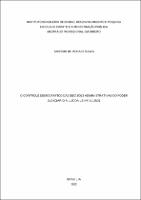Use este identificador para citar ou linkar para este item:
https://repositorio.idp.edu.br//handle/123456789/4024| Título: | O controle democrático das decisões administrativas do poder judiciário à luz da lei nº 14.129/21 |
| Autor(es): | Souza, Tarcisio de Moraes |
| Orientador(es): | Ribeiro, Carlos Vinícius Alves |
| Palavras-chave: | Democracia participativa;Poder judiciário;Controle social;Governo digital |
| Data de submissão: | 2022 |
| Citação: | SOUZA, Tarcisio de Moraes. O controle democrático das decisões administrativas do poder judiciário à luz da lei nº 14.129/21. 2022. 109 f. Dissertação (Mestrado profissional em Direito) – Instituto Brasileiro de Ensino, Desenvolvimento e Pesquisa, Brasília, 2022. |
| Resumo: | A crise de representatividade vivenciada pela democracia naturalmente tem efeitos no Poder
Judiciário, contribuindo para o avanço do descrédito popular nas instituições e de
questionamentos sobre a sua legitimidade. Como consequência, o movimento legislativo
destinado a assegurar maior influência do povo nas decisões políticas do Estado deve ser
adequadamente assimilado por esse Poder. Isso contribui para a superação da cultura tradicional
que lhe impôs a postura de fechamento institucional responsável por torná-lo alheio a elementos
externos, incluindo a vontade popular. Sob tal contexto, a pesquisa buscou resolver o seguinte
problema: possibilitará a Lei nº 14.129/21 maior controle democrático das decisões
administrativas do Poder Judiciário? A revisão bibliográfica sobre o regime democrático e o
sistema de controle social proporcionou a ampliação do estudo teórico sobre a Administração
Pública Democrática e, assim, a extração de relevantes premissas aplicáveis ao Poder
Judiciário, tendo como referência a aptidão dos meios eletrônicos de comunicação para facilitar
e assegurar a efetiva participação popular. A instituição do Governo Digital do Poder Judiciário
e o uso das ferramentas previstas na referida norma para atrair a presença popular representaram
alternativa real para minorar os danos advindos do momento de instabilidade do regime
democrático, embora a influência do povo nas deliberações administrativas do Poder Judiciário
ainda esteja em grau deficitário. |
| Abstract: | The crisis of representativeness experienced by democracy naturally has effects on the Judiciary, contributing to the advancement of popular discredit in institutions and questions about their legitimacy. Consequently, the legislative movement aimed at ensuring greater influence of the people in the political decisions of the State must be properly assimilated by this Power, helping to overcome the traditional culture that imposed on it the posture of institutional closure that makes it oblivious to external elements, including the popular will. In this context, the research sought to solve the following problem: will Law nº 14.129/21 allow greater democratic control of the administrative decisions of the Judiciary? The bibliographic review on the democratic regime and the system of social control made it possible to expand the theoretical study on Democratic Public Administration and, thus, extract relevant premises applicable to the Judiciary, having as a guide the ability of electronic means of communication to facilitate and ensure the effective popular participation. The institution of the Digital Government of the Judiciary and the use of the tools provided for in the aforementioned rule to attract popular presence represented a real alternative to lessen the damage arising from the moment of instability of the democratic regime, although the influence of the people in the administrative deliberations of the Judiciary is still in deficit. |
| URI: | https://repositorio.idp.edu.br//handle/123456789/4024 |
| Aparece nas coleções: | Mestrado Acadêmico em Direito Constitucional |
Arquivos associados a este item:
| Arquivo | Descrição | Tamanho | Formato | |
|---|---|---|---|---|
| DISSERTAÇÃO_ TARCISIO DE MORAES SOUZA_MESTRADO ACADÊMICO.pdf | 756.95 kB | Adobe PDF |  Visualizar/Abrir |
Os itens no repositório estão protegidos por copyright, com todos os direitos reservados, salvo quando é indicado o contrário.
